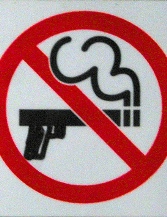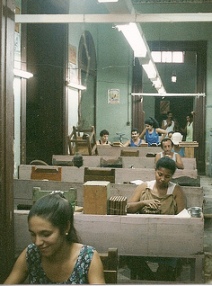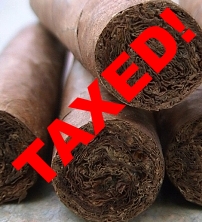Stogie Commentary: Smoking Bans Revisited
7 Apr 2009
With traditionally cigar-friendly locales like Dallas and North Carolina set to enact smoking bans soon, today presents a good opportunity to revisit our case against these unjust and tyrannical laws.
 Regular readers will recall that, over the years, we’ve written a great deal about the lamentable spread of state and local smoking bans. While my colleagues and I try to keep our web magazine focused more on tobacco and less on politics, some issues—predominantly taxes and bans—cannot and should not be avoided.
Regular readers will recall that, over the years, we’ve written a great deal about the lamentable spread of state and local smoking bans. While my colleagues and I try to keep our web magazine focused more on tobacco and less on politics, some issues—predominantly taxes and bans—cannot and should not be avoided.
So, here I intend to piece together many of the arguments we and others have made against the draconian smoking ban movement. My goals are threefold: (1) to potentially convince those who remain unconvinced, (2) to refresh our memories, and (3) to provide fellow brothers of the leaf with ammunition for their own debates on the subject.
Protect Whom?
One of our first commentaries on this subject was written back in May of 2006. It was prompted by city officials in Calabasas, California, who had approved a law that prohibits all smoking outdoors (except for in city-approved designated “smoking areasâ€). Given the complete lack of scientific data regarding outdoor secondhand smoke, I concluded that Calabasas officials weren’t trying to “protect†nonsmokers—they were trying to “protect†smokers, the very people who are consciously choosing to smoke.
That realization shouldn’t have come as a surprise. After all, the aim of every smoking ban, whether outdoors or inside private buildings, is for the government to control the actions of consenting adults.
The argument that bans are needed to protect the waitresses, bartenders, busboys, etc. who work in smoking facilities is also ill-conceived. As our friend Jacob Grier (a bartender) recently pointed out in an op-ed, there are many jobs that expose workers to riskier activities (such as Oregon’s requirement of full-service gas stations, which exposes attendants to harmful gas fumes). Besides, if secondhand smoke is a main concern, one can simply opt for a career or an employer that self-regulates tobacco use in the workplace.
Funny Science
In the open air or inside a bar, “health concerns†seem to be a mere ruse to disguise a movement of politicians, bureaucrats, and busybodies who would simply rather not smell, be near, or tolerate tobacco. Keep in mind that the notion of secondhand smoke as an epidemic is totally overblown.
While the AFL-CIO claims that “secondhand smoke is estimated to cause 65,000 deaths per year in the U.S.,†that number is just plain wrong. It’s 20 times the estimate of the Center for Disease Control, and even the CDC estimate was roundly rejected by a federal court. Thomas A. Lambert’s “The Case Against Smoking Bans†summarizes how various agencies and groups used biased “scientific†studies to make secondhand smoke appear to be risky enough to merit “a significant intrusion on the personal liberty of business owners and their customers.â€
It’s Economics, Stupid
Famed George Mason University economist Walter E. Williams argues that smoking bans persist and spread despite common sense because “the cost to nonsmokers to impose their will on smokers, say, in a restaurant, bar, or airplane, is zero, or close to it.†The act of voting for politicians who will impose majority rule over minority rights is inexpensive, and zero-priced activities have sub-optimal outcomes.
Allowing the market to dictate smoking preferences, however, provides for choice. Some establishments will cater to smokers. Others, if demand merits, will spring up as profit-motivated business owners ban smoking to cater to desired preferences. Here in northern Virginia, in the absence of any smoking ban (though a statewide ban is forthcoming), many if not most restaurants are currently smoke-free.
Choose Liberty
The most compelling argument against smoking bans, in my opinion, is the notion that consenting adults have rights to do with their bodies what they so please, and private business owners have rights to offer the accommodations they so choose. Whatever the perceived social ill, government regulation and intervention is usually a “cure†worse than the disease.
photo credit: Flickr

 My first run-in with this Don Pepin Garcia line was, I’d have to say, not nearly as pleasant as the experience my colleague
My first run-in with this Don Pepin Garcia line was, I’d have to say, not nearly as pleasant as the experience my colleague 

 1) With the federal government’s 700% tax increase on “large†cigars taking effect this week, families in America and across the Caribbean are bracing for the worst. Miami’s Little Havana neighborhood, as reported by the
1) With the federal government’s 700% tax increase on “large†cigars taking effect this week, families in America and across the Caribbean are bracing for the worst. Miami’s Little Havana neighborhood, as reported by the  1. Will General and Altadis move to increase their market shares? The two giants already control a large share of the market and have expanded their reach in recent years to include huge retailers, a magazine, distributors, and who knows what else. I would be flabbergasted if we don’t see more buyouts, especially of boutique manufacturers.
1. Will General and Altadis move to increase their market shares? The two giants already control a large share of the market and have expanded their reach in recent years to include huge retailers, a magazine, distributors, and who knows what else. I would be flabbergasted if we don’t see more buyouts, especially of boutique manufacturers. Under SCHIP, large cigars will be taxed at 52.75 percent, with a cap of 40.26 cents per cigar. This enormous increase, up from the previous rate of 20.719 percent with a cap of 4.875 cents per cigar, has many worried that it will devastate an industry already under siege due to state tax hikes and smoking bans.
Under SCHIP, large cigars will be taxed at 52.75 percent, with a cap of 40.26 cents per cigar. This enormous increase, up from the previous rate of 20.719 percent with a cap of 4.875 cents per cigar, has many worried that it will devastate an industry already under siege due to state tax hikes and smoking bans. Patrick Ashby
Co-Founder & Editor in Chief
Patrick Ashby
Co-Founder & Editor in Chief Patrick Semmens
Co-Founder & Publisher
Patrick Semmens
Co-Founder & Publisher George Edmonson
Tampa Bureau Chief
George Edmonson
Tampa Bureau Chief